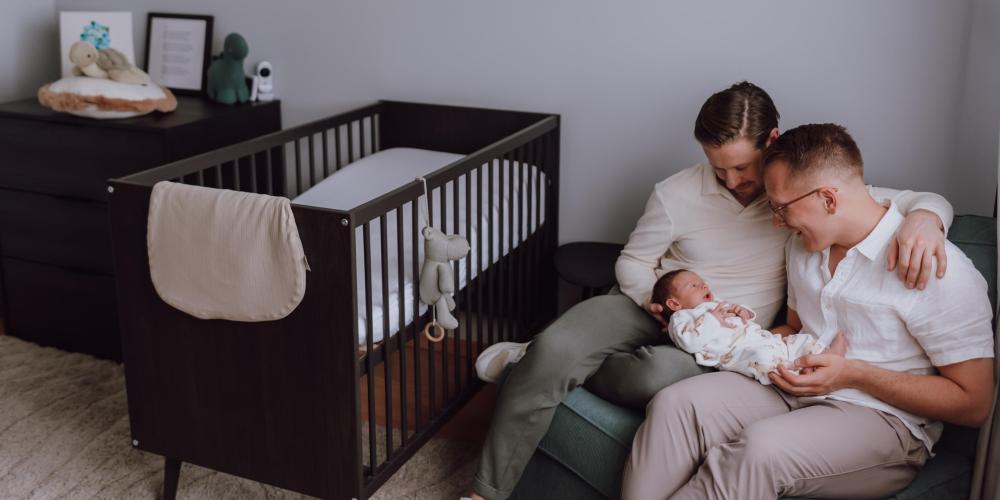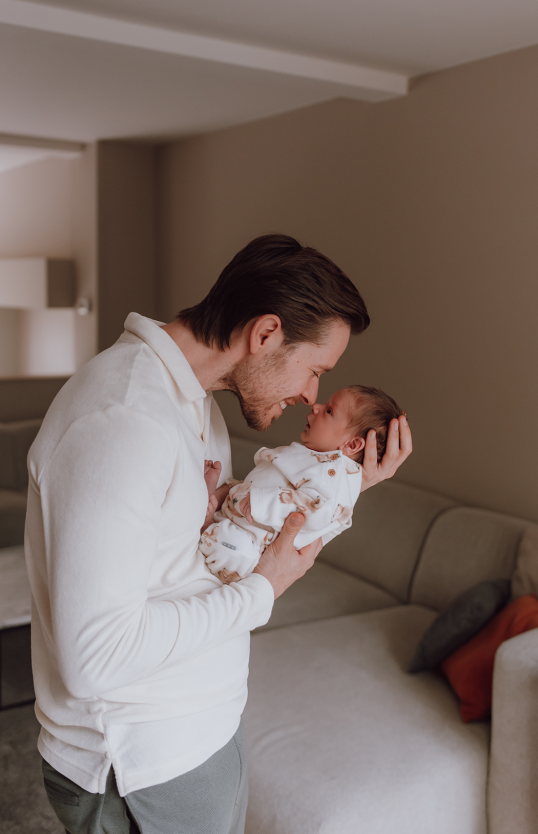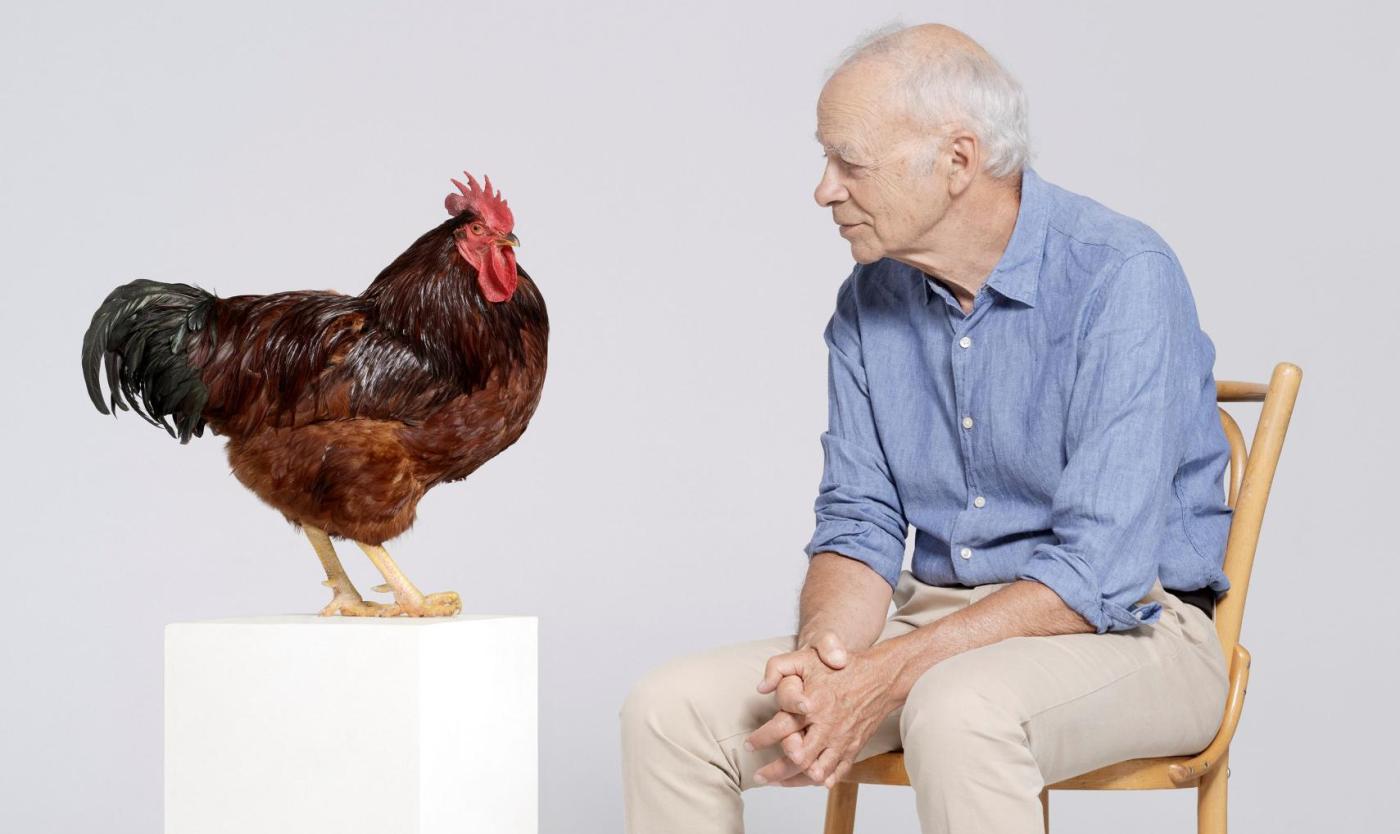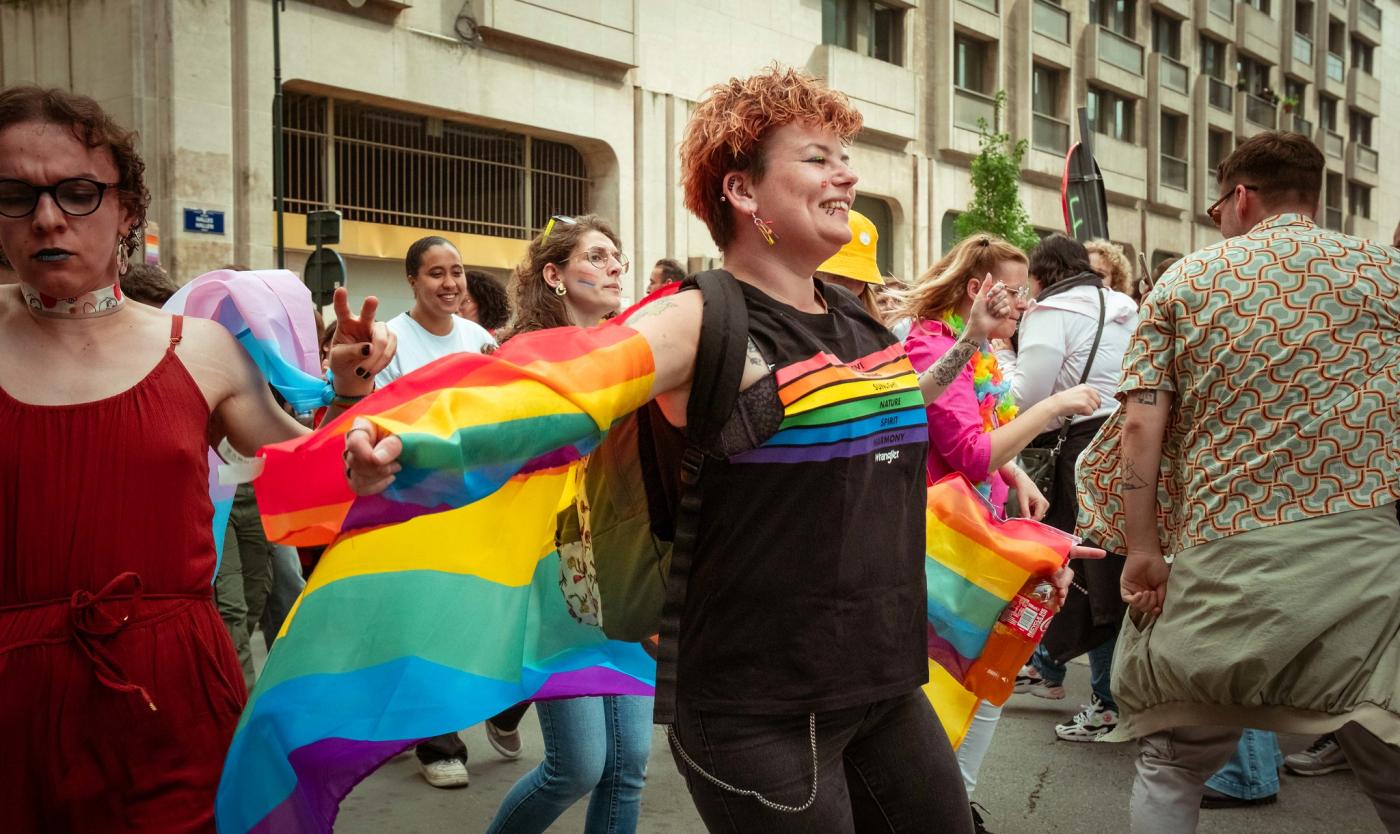
Mychal Langenus, professor of Management and Strategy at the Faculty of Social Sciences and Solvay Business School, became a father to baby Seth with his partner just a year ago. Their journey was filled with joy and deep gratitude, but also with confusion and challenges. Because for two men, starting a family in our society is anything but straightforward. By sharing their story, he hopes to help change that.
Join VUB at the Brussels Pride on 17 May
First things first: congratulations on your baby boy! How did your journey towards parenthood begin?
Mychal Langenus: “Four years ago, we decided we wanted to grow our family. Adoption seemed like the obvious route, so we signed up for the required information sessions. But when we found out it could take at least ten years before we’d be able to adopt a baby, that hit hard. Are we really going to spend a decade focusing on this, not even knowing if it will work out? So we started exploring other options – although we’re still on that adoption waiting list.”
That other option was surrogacy?
“When people asked if we wanted children, we were always honest about our situation. Surrogacy would sometimes come up – and the fact that there’s barely any information about it in Belgium. You can go to the United States or Canada, but you’re looking at a minimum of €150,000. That simply wasn’t an option for us. Then a friend gave me the number of someone who had gone through the surrogacy process at UZ Gent with his partner. He encouraged me to contact them. They were incredibly welcoming and open—we were invited to come in straight away. A doctor explained how the whole process works, and we learned that if we made it through all the steps – and there are a lot of them – we could have a baby within a year.”
“For male couples, nothing in the surrogacy process is reimbursed – which means for many, it’s not even an option”

Mychal and his son Seth
And how do you even start such a process?
“The egg donor and the surrogate have to be two different women. As a male couple, you’re not allowed to use the national egg bank unless you’re doing a reciprocal donation. My sister-in-law had previously said she’d be willing to donate her eggs. But then we still needed to find a surrogate. The surrogate must already have children, can’t have any desire for more, must have had completely smooth pregnancies, be under the age of 40, and you have to know her personally. We know a lot of women, but that suddenly narrowed it down to a very small group.
Because my sister is the person I trust most in the world—and it allowed us to keep things within the family—I took a deep breath and asked her. She reacted really well. She wanted to take her time and not give an emotional answer. She had two young children herself and was in the middle of home renovations. I told her to take all the time she needed, and that no matter her decision, nothing would change between us.
A month later, she called me on video. Through her daughter, she let us know that we were going to be dads. That happened to be the same day I was planning to propose to my partner. It turned into an unforgettable day.”
You had your donor and surrogate. What happens next?
“That’s when the first of many, many appointments at UZ Gent began. We had to share a lot of information, check if we met all the criteria, and go through psychological assessments. Every three months, a multidisciplinary committee would meet to review our case. Once we got the green light, the actual medical screening of my sister and sister-in-law could begin. My sister had to see an internist, have her uterus and organs examined. A process like this can reveal a lot, sometimes even issues that aren’t directly related but still have implications. After about forty appointments—many of which involved all of us driving to Ghent together—the two women were allowed to start their hormone treatments.”
Did everything go smoothly from there?
“With the first attempt, we had five high-quality eggs, but none of them developed properly during the five-day lab phase. We started off with so much hope, so hearing that none had made it was crushing. It really pulls the ground out from under you. And you can’t just try again the next month. When the second egg retrieval happened, there was only one viable egg. We had a choice: don’t go ahead and save the cost of the embryo transfer—or take the leap, knowing it might be our last shot. My sister didn’t want to go through it again after turning 38, and that birthday was approaching fast. So we went for it. And from that one egg, our son was born. The whole process took two years.”
How much does a treatment like this cost?
“For male couples, nothing is reimbursed by the health insurance system. Hetero couples, lesbian couples and trans couples are entitled to six attempts per person. Each attempt costs between €5,000 and €6,000. You don’t exactly want to be piling up debt before your child is even born. Having to consider giving up because of the cost – that’s a heavy burden. We were lucky in many ways: it worked on the second attempt, we managed to cope both mentally and financially, we had access to UZ Gent, and we had the support of our sisters. That’s not the case for everyone. For many, this simply isn’t an option. So if you don’t have the financial means, you’re basically excluded. And society doesn’t seem to be aware of that.”
“I’m still in the adoption process—even though I’m the biological father of my own child”
How did your friends and family react?
“They were over the moon. Our parents knew we were looking for a surrogate, but when I told them during a family dinner that we’d found one—and that she was sitting at the table with us—they were all incredibly proud. My mother-in-law was also overjoyed. It brought our whole family much closer together. We asked our sisters to be godmothers, and they were absolutely thrilled. Our friends were very supportive too, and even when we shared our story in the media, the negative reactions were minimal. But with many organisations, we first had to explain our entire situation before they’d even let us in the door—like with Kind & Gezin and the local council. I’m still in the process of adopting my child.”
How is that possible?
“My sister is in a legally registered partnership, but not married to her partner. That worked in our favour, because my partner was able to officially recognise the child with her. I can’t exactly walk into the town hall with my sister and say: ‘We made a baby together.’”
So your sister is listed as the legal mother?
“Yes. In Belgium, the woman who gives birth is automatically the legal mother. If she’s married, her spouse is automatically the legal father. That means my brother-in-law would have been the legal father of my child, even though Seth is biologically mine. My partner was able to recognise our son together with my sister, even though he’s not the biological father. Luckily that went through after quite a bit of hassle, which meant he could apply for support from Kind & Gezin, arrange maternity help, and register with the childminder. But everything was still in the mother’s name. We’d agreed with my sister that she wouldn’t have to deal with any of that. I even had to go to the police to explain the situation, and she had to confirm why she was supposedly giving up her child—despite the fact that all the authorities were fully aware of the context. It’s now in the federal coalition agreement that a legal framework will be developed for this specific situation. That framework will use the term ‘draagvrouw’ (gestational carrier) instead of ‘draagmoeder’ (surrogate mother), which we’re really pleased about.”
And how do those institutions react when you explain it all for the umpteenth time?
“The person from Kind & Gezin who came to our house admitted that it was strange only the mother could submit applications. She said it no longer reflected reality, and promised to request an update. The same thing happened in the hospital, at the social services desk. We wanted to be present at the birth and hold our baby straight away. That was also my sister’s wish, and the agreement with the gynaecologist and midwives was crystal clear: Seth wouldn’t be handed to my sister, he would go straight to his parents. The hospital supported us completely. It was a beautiful experience. And the VUB deserves credit too: I didn’t have formal parental leave, but my adoption leave was approved without hesitation. There was so much understanding for our situation.”
“My child doesn’t need to be shielded from this beautiful story. This is just how it is”
What kind of agreements did you make in advance with your sister?
“Loads. You have to talk about everything. What if the NIPT test shows something? What if it’s twins? What happens in case of a miscarriage? Luckily, we have a really strong bond, so we could talk openly and were completely aligned. The general rule was: as long as it’s about her body and the baby is growing inside her, she has the final say. When it came to the health of the baby, we were allowed to decide. She also has two young children, now three and five, so we had to discuss how to talk to them about it too. My partner and I helped out with them a lot more during that time.
What’s not allowed—and what never even came up—is financial compensation. That’s illegal in Belgium. You can cover costs, like maternity clothes or hospital bills. UZ Gent actually advised us to keep a folder of receipts, in case it was needed for the adoption review. So yes, we have an actual folder with receipts for pregnancy trousers and all sorts.”
Did you also talk about what role your sisters would have in your son’s life?
“The roles we agreed on just naturally unfolded that way. Both sisters feel like aunties and godmothers, and have always seen Seth as our child. They never looked at it differently or referred to it in any other way. During those first months, we often checked in with them about how they were feeling. My sister-in-law doesn’t have children herself. When my sister had recovered from the birth, she said quite casually—and genuinely—‘Now I’d really like to see my nephew.’ She came to the hospital too, so we had a moment with everyone who made Seth’s arrival possible.”
What story will you tell Seth?
“We’ll always tell him exactly how it happened. We’re not going to hide anything or wait until he’s a certain age. Even now, when he doesn’t understand it yet, we still talk about it openly. My child doesn’t need to be shielded from this beautiful story—this is his story. If people ever have questions, we’ll answer honestly and calmly. We’re a happy family, and that’s all that matters. If anyone ever says something to him because he has two dads, I hope he can deal with that in the same open way. There are so many different types of families, and that’s perfectly fine—as long as there’s love. That’s what makes a family. Not how it’s composed.”
Across the world, the value of equality is under pressure. How do you view that—as a new dad?
“The news does scare me sometimes, but I try to focus on where I can make a difference, on what we can do for equal rights. If I’m not careful, I get completely overwhelmed by the media. But when I look at my own experience, I feel more hopeful. We’re drowning in negativity these days, to the point where it feels hard to even catch your breath. But when I look back at how our friends, neighbours and organisations reacted, and at how happy Seth is—that keeps me grounded. As long as we focus on real human connections and impact, and don’t isolate ourselves in a bubble of headlines, there’s hope.
Still, we’re nowhere near full equality. We’re still fighting for it. Visibility and events like Pride are crucial—we’re not there yet. At the VUB, I really feel that freedom and celebration of difference, and it’s genuinely lived out.”
“We’ve always focused on the joy that each step brought—not on how much harder it was for us compared to others”
What actions do you take yourself to fight for that equality?
“The last thing I want is for the voices of people who are against us—just because they don’t understand—to be louder than ours. I don’t need to shout, but I do want to be heard. Sometimes that’s through a big action, sometimes something smaller. Like bringing Seth to Pride when he was just a few months old. You see everyone having a great time, united behind one message: that anything rooted in love and happiness is valid. Those are the moments that remind me why this fight matters.
If you grow up feeling different, thinking you have to hide, and then suddenly enter a space where nearly everyone is like you—it’s incredibly liberating. I don’t want Seth to go through years of that. I want him to feel free from the very beginning. Once the adoption process is finished, I want to get even more involved.”
Did you ever feel frustration or anger during the process—because of how difficult it was for you?
“I wish every person who wants a child could have one. It’s an enormous joy. But you’re dependent on so many people—psychologists, doctors, finances, institutions—who all have the power to say: ‘Not for you.’ And that can feel deeply dehumanising. It’s hard not to compare yourself to others. But we always focused on the joy that every step brought, rather than how hard it was compared to other people’s paths. What matters is that we found a way. Would I want it to be easier? Yes. Would I want it to be the same for everyone? Absolutely—and that’s what I want to fight for.
Now that we’re proud parents, and after a first year that was both blissful and intense, I want to shine a light on the obstacles. If we can help improve the legal framework for others, that would be something to be proud of.”*
Join VUB at the Brussels Pride on 17 May
*This is a machine translation. We apologise for any inaccuracies.
Fertility centre UZ Brussel
VUB professor Herman Tournaye heads the Brussels IVF fertility centre at UZ Brussel. 'We have long since stopped assuming the traditional view that a child must have one mother and one father. It often turns out that these are people who have thought very hard. They are convinced of that construction and have made clear agreements about parenting."
In Belgium, six centres offer fertility procedures with a surrogate mother:
- UZ Gent
- UZ Antwerpen
- UZ Brussel
- CHIREC (Edith Cavell) Brussels
- Saint Peter's Hospital Brussels
- Citadelle Liège

